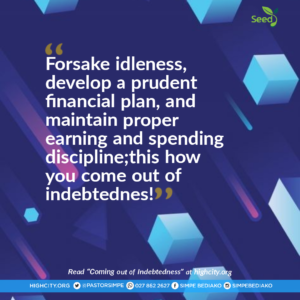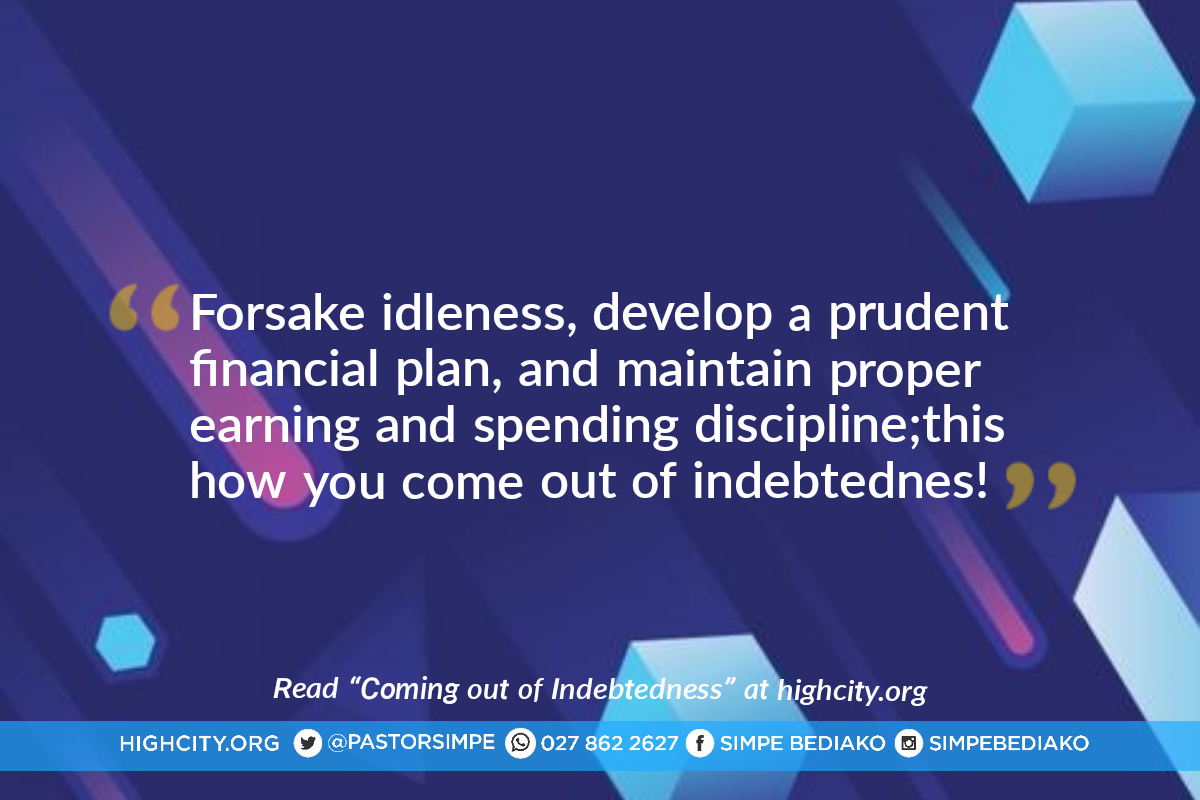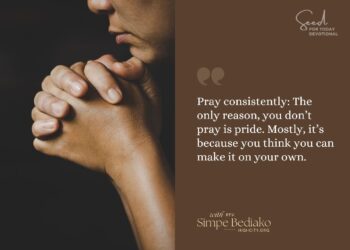2 Kings 4:1-7 KJV] “Now there cried a certain woman of the wives of the sons of the prophets unto Elisha, saying, Thy servant my husband is dead; and thou knowest that thy servant did fear the Lord : and the creditor is come to take unto him my two sons to be bondmen. [2] And Elisha said unto her, What shall I do for thee? tell me, what hast thou in the house? And she said, Thine handmaid hath not any thing in the house, save a pot of oil.
[3] Then he said, Go, borrow thee vessels abroad of all thy neighbours, even empty vessels; borrow not a few. [4] And when thou art come in, thou shalt shut the door upon thee and upon thy sons, and shalt pour out into all those vessels, and thou shalt set aside that which is full”.
[5] “So she went from him, and shut the door upon her and upon her sons, who brought the vessels to her; and she poured out. [6] And it came to pass, when the vessels were full, that she said unto her son, Bring me yet a vessel. And he said unto her, There is not a vessel more. And the oil stayed. [7] Then she came and told the man of God. And he said, Go, sell the oil, and pay thy debt, and live thou and thy children of the rest”.
I want to speak to you today about coming out of indebtedness. God does not want any of His precious children to be indebted. This is because the borrower is a servant to the lender. God wants every one of us to “owe no man nothing but love”. God has planned that we shall live our lives in abundance and not in indebtedness nor scarcity. You should not eat your bread in scarcity. We shall eat our bread to the full.
What is indebtedness?
In context, indebtedness is when your total liquid assets cannot pay off your current liability and leave you with a surplus. Whenever your current assets cannot pay off your current liability, I believe you are in the red.
Current liabilities are a person’s short-term financial obligations that are due within one year or within a normal operating cycle. Current liabilities are typically settled using currentassets, which are assets that are used up within one year.
Examples of your current liabilities are accrued expenses and payables that are due, like rent, bills, and other recurrent costs.

Every one of us must have enough supply to meet these due or recurrent needs. You are indebted if you do not have enough to pay for food you have eaten, light and water bills, school fees, rent, etc; and do not have hopes of generating income now to pay them off.
Why people become indebted
Many are indebted because of a lack of prudent financial planning, an expanded taste, lack of frugality, a poor maintenance culture, or a need to finance an emergency that drains their resources. For instance, they had to pay the health bills of a child or spouse who is suddenly taken ill, or that a tool or equipment needed for their work suddenly broke down and needed to be repaired.
One thing you must know is that indebtedness knows no race, age, level of education, or level of income; Anyone can be indebted, but the following keys can help you escape this trap of bondage;
- Forsake idleness
- Develop a prudent financial plan
- Maintain proper earning and spending discipline
We must escape the trap of poverty and indebtedness because aside covetous, greed and the love of money; nothing destroys people than their poverty and indebtedness.
[Proverbs 10:15 KJV] “The rich man’s wealth is his strong city: the destruction of the poor is their poverty.
The love of money is the root of all evil, but the root of the poor man’s destruction is his poverty. Many have lost relations, legacies, opportunities and great virtues because of poverty. I pray that you shall come out of every financial crisis and be able to live an honest life. May the almighty God bring us favour and wisdom to come out of this crisis.
The gospel must be preached and we need resources to preach the gospel. I pray that the Lord shall help each of us to rise financially and have divine sufficiency. I pray that you shall receive a sudden turnaround to be able to support the work of missions and the beginning of the gospel.
Steps to coming out
1. If you have a job, do it with all your might:
The Bible says “whatsoever your hands have found to do, do it with all your might”; this is because in the grave who you go, there is ko work nor device, besides the poor man’s wisdom is despised.
2. As far as it is possible, cut your spending to fit your earning:
Many become indebted because they spend what they have not earned. They make plans they can’t finance. They chose school and standards of life they can’t pay for. You must plan and cut your spending to match your earning.
If you are a student, try your best to live within your means. Don’t expand your taste too much.
3. Believe God for another stream of income if you do not earn enough:
If your income cannot pay for your food and shelter, then you need another stream of income. Don’t be driven by greed and covetousness to juggle four jobs that would adversely affect your health, fellowship, and parental responsibility.
4. Find a job, if you’re unemployed:
There is no food for the lazy man. If you don’t have a job, find one. If nobody will employ you, then employ yourself; please, the keyword here is “IF”. There is this whole new craze of start on your own! Start on your own! Please try to, first of all, find a job; if nobody will employ you, then you employ yourself.
Do you really want a sudden turnaround? Are you presently unemployed? Are you presently not engaged? Then the following are five steps to come out of indebtedness by employing yourself.
1. Take inventory of what you have at home:
Don’t borrow money to start a business; start-up, take time to break even and make a profit. Just start with what you have at home; it’s prudent and safe.
2. Borrow Vessels from neighbours:
Borrow vessels from neighbours; the vessels stand for tools, equipment, technology, etc.
3. Start the business at home with your sons:
The whole wisdom is to try and keep your overhead expenses to the barest minimum. Start from home, rather than renting a space. This is the wisdom of starting anything: a business, church, etc.
4. Go, sell the oil, pay your debt, and live on the rest:
You cannot just pay off your debt, you must engage in further trading and prudent spending to stay out of debt.
5. No matter how successful you become, stay in fellowship with your pastor:
Your pastor is given as a guide. Your pastor has been appointed to guide you. Stay in fellowship with him; except he is obviously leading you away from God. The woman came back to the prophet and sought for further counsel.
Be blessed, and stay out of debt! I love you!Kofi Simpe
[/et_pb_text][/et_pb_column][/et_pb_row][/et_pb_section]














